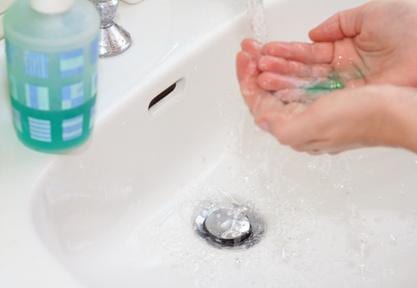Although the term “swine flu” may be a misnomer–swine flu is not from pigs–nobody wants to get this flu. Symptoms are fever, sore throat, cough, stuffy or runny nose, headaches, body aches, fatigue and chills. More accurately renamed H1N1, the World Health Organization (WHO) declared this virus a pandemic in June 2009. When new viruses become pandemics, the possibility exists that the virus will circulate in the future, according to the Centers for Disease Control and Prevention (CDC).
How Swine Flu Spreads
Whether you call it swine flu or H1N1, the virus is still the same, and it is contagious. It spreads just like any other type of flu, person to person. You can get the swine flu by being near someone who has it and coughs, sneezes or talks near you. You can also get it by touching an object or surface that has the swine flu virus on it and then by bringing your hand near your mouth or nose.
Prevent Swine Flu
One way to help prevent getting the swine flu is to wash your hands often. Soap and water are the best way. If not available, an alcohol based hand rub–a hand sanitizer–is the next best choice, according to the CDC. To use a hand sanitizer, apply enough gel into your hands to wet them thoroughly. Rub the gel into your hands until they are dry. The alcohol will kill the germs.
Hand Sanitizer
Hand sanitizer works when it evaporates into the skin and kills the bacteria. Soap and water wash away the germs. Either way, you should wash for at least 20 seconds, recommends Dr. Nilmarie Guzman, who is with the University of Florida Infectious Disease Division.
Hand Hygiene
The Association for Professionals in Infection Control and Epidemiology stresses the importance of hand hygiene in preventing disease and says that hand hygiene is the most simple and effective way to reduce the transmission of germs. This association indicates that both soap and water and hand sanitizers are effective.
Bacterial Immunity
A scare went around that hand sanitizers may lead to bacterial resistance. But, no evidence shows that organisms adapt and become immune to the alcohol-based hand sanitizers, according to the Medical News Today website.
People At Risk
The high-risk groups for swine flu are children younger than 5 years old, adults older than 65 and pregnant women. So, if you are pregnant with children in pre-school, make sure you and your children wash your hands and use hand sanitizer throughout the day. Bring some hand sanitizer to your pre-school teacher and stress how important it is for the children to use it.
Photo Credit
- washing hands image by Julia Britvich from Fotolia.com





